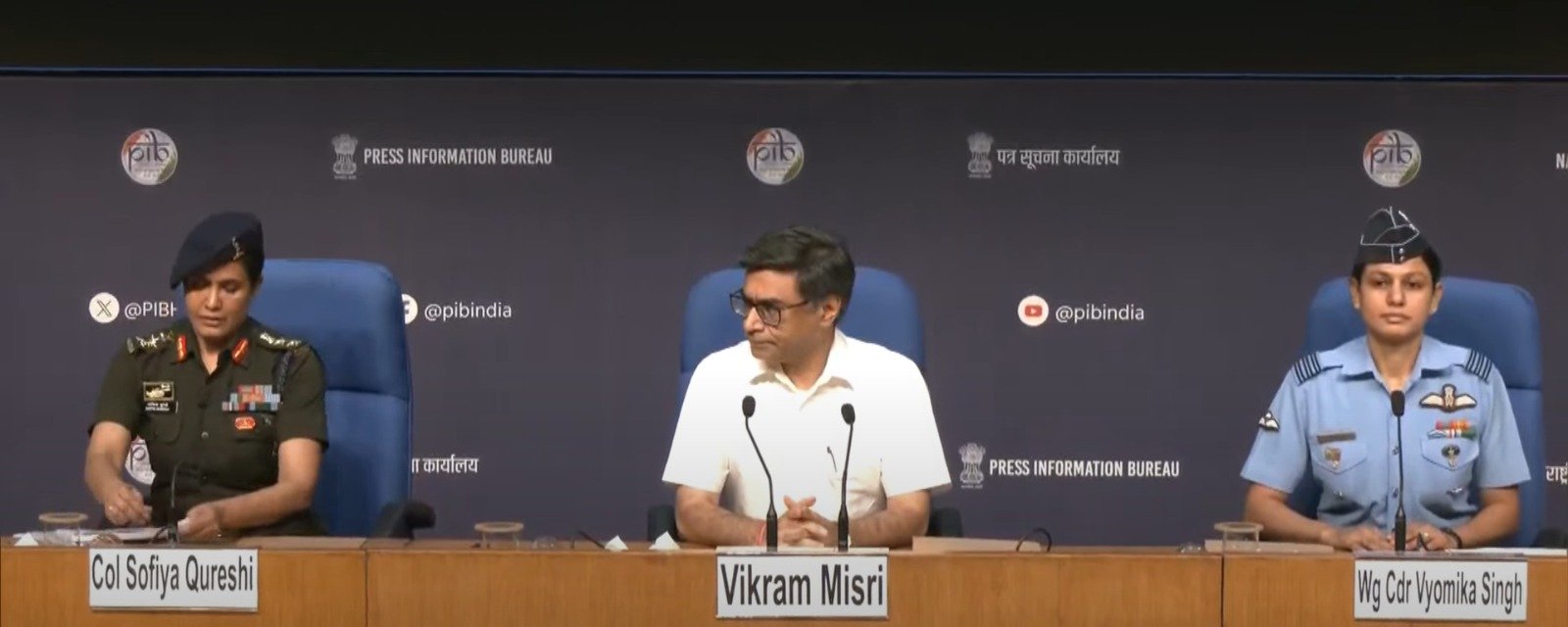The Indian Armed Forces conducted precision strikes on terrorist infrastructure in Pakistan and Pakistan-Occupied Kashmir in response to the Pahalgam attacks in which 26 civilians were killed on April 22.
India struck bases in Pakistan and PoK from where terrorist attacks were being planned and directed. A total of nine sites were targeted in the overnight precision strikes under the codename ‘Operation Sindoor’.
With an aim to provide details, the government of India conducted a press conference, which was addressed by Foreign Secretary Vikram Misri and supported by two women – Col. Sofiya Qureshi and Wg. Cdr. Vyomika Singh.
Pakistan’s Identity as a Haven for Terrorists
Foreign Secretary Vikram Misri opened the briefing with a firm statement on the rationale behind the operation. “Pakistan has a well-defined identity as a haven for terrorists,” he said, underlining the country’s continued role in sheltering banned international terrorists. “Banned international terrorists find it safe from being punished in this country. Pakistan is also known for deliberately misleading the world and international platforms.”
Referring to the Pahalgam attack, Misri added, “On April 22, a Pakistani and Pakistan-trained terrorist, associated with Lashkar-e-Taiba, launched a barbaric attack on tourists in Pahalgam. Twenty-five Indians, and one Nepali citizen were cowardly murdered. This is the most serious incident since the 2008 Mumbai attack considering that civilians were attacked.”
He added, “The attack in Pahalgam was marked with extreme barbarity, with the victims mostly killed with headshots from close range, and in front of their families. The family members were deliberately traumatised through the manner of the killing, accompanied by the exhortation that they should take back the message.”
Misri asserted that the attack was driven by the objective of undermining the normalcy returning to Jammu and Kashmir and to impact the tourism sector, which was the major source of incomes of the people in the region.
He explained that intelligence had indicated further attacks were being planned, and India was compelled to act. “India exercised its right to respond. The measures were measured and non-escalatory,” he emphasised, reiterating that the strikes were focused on terror infrastructure and not on Pakistani military establishments.
Details of Operation Sindoor
Colonel Sofiya Qureshi of the Indian Army provided operational details, stating, “Operation Sindoor was carried out by the Indian armed forces between 1:05 AM and 1:30 AM on May 7 to avenge the Pahalgam terror attack.” She emphasised the joint nature of the action, with the Army, Navy, and Air Force working together to ensure the strikes were both effective and restrained.
“India was careful in safeguarding civilian infrastructure and avoiding civilian casualties in Pakistan,” Col. Qureshi noted, underlining the targeted nature of the operation. She confirmed that the operation focused on destroying terror camps with direct links to the recent and past attacks in Kashmir.
Wing Commander Vyomika Singh of the Indian Air Force highlighted the professionalism and coordination displayed during the strikes. “This was a joint effort by the Indian Air Force, Army, and Navy, employing precision strike weapons to ensure that only terror-linked sites were targeted,” she said. “Our aim was to deliver justice for the victims of the Pahalgam attack while upholding our commitment to international norms and minimising collateral damage,” she added, describing the operation as a tribute to the innocent lives lost.
The nine terror camps targeted and destroyed during Operation Sindoor were identified as:
– Markaz Subhan Allah, Bahawalpur (Jaish-e-Mohammed)
– Markaz Taiba, Muridke (Lashkar-e-Taiba)
– Sarjal, Tehra Kalan (Jaish-e-Mohammed)
– Mehmoona Joya, Sialkot (Hizbul Mujahideen)
– Markaz Ahle Hadith, Barnala (Lashkar-e-Taiba)
– Markaz Abbas, Kotli (Jaish-e-Mohammed)
– Maskar Raheel Shahid, Kotli (Hizbul Mujahideen)
– Shawai Nalla Camp, Muzaffarabad (Lashkar-e-Taiba)
– Syedna Bilal Camp, Muzaffarabad (Jaish-e-Mohammed)
Officials reiterated that the strikes were designed to degrade the operational capabilities of Lashkar-e-Taiba, Jaish-e-Mohammed, and Hizbul Mujahideen, and that no Pakistani military facilities were targeted.
The government concluded by calling on the international community to recognise the ongoing threat of cross-border terrorism and reaffirmed India’s commitment to holding the perpetrators of the Pahalgam attack accountable.


